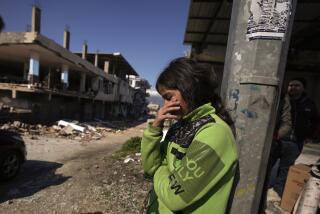Myanmar group building shelters in disaster zone
- Share via
LABUTTA, MYANMAR — Bloggers may find their messages blocked by Myanmar’s military regime, but that hasn’t stopped Nyi Lynn Seck from raising tens of thousands of dollars for cyclone survivors through his website.
The 29-year-old IT specialist and his friends are getting their hands dirty and putting the donations to work by helping to build “Budget Huts” in the Irrawaddy River delta, a region still reeling from the May 2-3 Tropical Cyclone Nargis.
Days after the storm hit, Nyi Lynn Seck traveled from Yangon, the principal city, to the delta to document survivors’ stories. He posted their accounts and his photographs on his Web journal.
“I have been blogging for quite a long time and many overseas Myanmar citizens read it. They wanted me to go to the delta and help out,” he said.
Nyi Lynn Seck quit his job as a manager at a software company to lead six volunteers, including four other bloggers, on a mission to aid villages near the town of Labutta. They have been here since May 9.
He is an example of a grass-roots movement that has emerged in Myanmar, also known as Burma. Many of those doing private relief work are highly critical of the government response to the disaster.
Private efforts have filled some gaps in the relief effort, especially in the early weeks after the storm, when the government turned back most foreign relief workers. After pleas from the United Nations, the ruling generals agreed to accept international aid, but it still limits the activities of foreigners in the country.
Nyi Lynn Seck said most of the $30,000 received by the group came from Burmese expatriates in Thailand, Singapore and Malaysia, but that money had come in from as far as Europe.
Myanmar’s government, which strictly controls media, including the Internet, blocks most blogging sites. However, they are sometimes accessible by using a server that masks the site’s true origin.
Bloggers played a major role in ensuring the free flow of information during anti-government protests in Myanmar last fall and the violent crackdown that followed. At least one blogger, Nay Phone Latt, remains in prison.
Nyi Lynn Seck’s blog has included personal observations, advice for would-be bloggers and news items. It has not been seen as anti-government.
Nyi Lynn Seck said he became an aid worker because he thought the government’s response to the storm, which killed 78,000 people and left 56,000 missing, was inefficient.
“The government doesn’t rely much on a system or technology and they don’t know what to do. They work only on paper, so the help was really delayed,” he said.
Nyi Lynn Seck picked up his black leather laptop case and pulled out a stack of slides he shows to would-be donors. He also has two models of shelters, dubbed “Budget Huts,” made of wood and plastic.
The group, which calls itself Handy Myanmar Youths because it wants to lend a hand to survivors, has put up 88 huts in delta villages.
Such volunteerism is not always welcomed by the government. A popular comedian was taken from his Yangon home by police this month after going to the delta to help survivors.
Many Myanmar volunteers and the local staff of foreign aid agencies pack their vehicles with food, water and other supplies when heading into the delta; several have been harassed by police or their vehicles have been impounded.
Nyi Lynn Seck said the government approved his group’s project after they detailed their plans to authorities in Labutta and declared that no foreigners were directly involved.
The group makes five-to- six-hour trips by boat to coastal villages to deliver materials and tools to build the huts and supervise the construction, which is done mostly by survivors.
Because of the tides, the volunteers are unable to return to Labutta on the same day, so they usually spend at least one night sleeping on the bare ground without shelter from mosquitoes. Several have fallen ill.
The blogger said the group’s most pressing concerns were about sustaining the project despite the high price of materials and transportation.
“Now the biggest problem is that we’re having trouble finding wood in Labutta, and the wood is also getting very expensive,” Nyi Lynn Seck said.
“As long as there are funds and donors, hopefully we can keep this up for another two to three months here,” he said. “But I’m not so sure about the future.”
More to Read
Sign up for Essential California
The most important California stories and recommendations in your inbox every morning.
You may occasionally receive promotional content from the Los Angeles Times.












